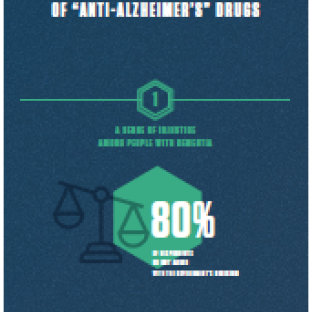It has been seven months since the French Government took the decision to stop reimbursing the four anti-dementia drugs currently approved in Europe. Since then, France Alzheimerhas repeatedly raised the alarm, drawing attention to the growing distress caused to the 3 million families affected. To ensure their voices and experiences are heard, the French organisation conducted a national survey between 9 October and 16 November 2018. 2,547 people (2,463 caregivers and 84 people with dementia) responded. France Alzheimerhas shared the same sense of incomprehension and abandonment as people with dementia and their families, since the decision was taken in June 2018. Given no alternative, the people affected are suffering the full consequences of the total delisting of “anti-Alzheimer’s” drugs. In response to the French Government's intransigence, the survey aimed to raise awareness of the issue.
Its results identify three immediate and worrying consequences:
-
The sudden cessation of treatment is causing a brutal increase in cognitive impairments. This deterioration was reported by 52% of respondents.
-
Families already under pressure now have to pay considerably more for these treatments, out of their own pockets: 2 out of 3 respondents were taking at least one of the four drugs when the announcement on delisting was made. 70% of them have no plans to stop their treatment. The main reason given, by 62.5% of the respondents was the effectiveness of their treatment. 20% have stopped their treatment and 10% expect to stop soon, mainly because of the excessive cost, especially given that VAT on these drugs has increased by 8 percentage points.
-
The therapeutic relationship between doctor and patient has broken down. Only 55% of those who have decided to stop taking their treatment will continue to see a specialist, 38% have already stopped doing so, and 7% are considering it.
For the sake of people with dementia and their families, the Government must now prioritise research, France Alzheimer stresses. Part of the financial effort must be devoted to clinical research required to offer patients long-term solutions that are fully funded and appropriate for their needs. This vision is shared by 68% of the caregivers who responded and 77% of the people with dementia. With a resounding silence on this subject from the French Government, France Alzheimer has decided to provide EUR 200,000 to fund a clinical trial. It will study the impact of daily doses of Donepezil on participants’ cognitive abilities over a three-year period, in the hope of finding new and concrete results that could reverse the decision to delist these drugs and resume funding for them.
